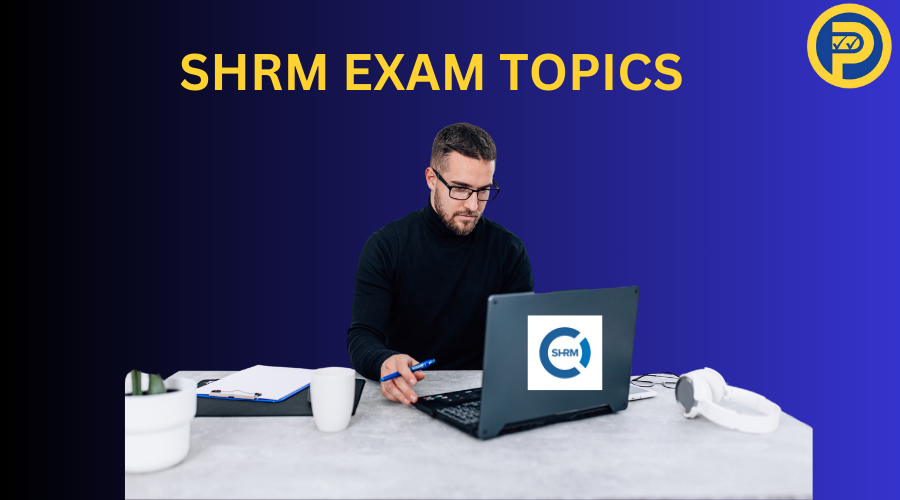Are you planning to take the SHRM exams, either the SHRM-CP or SHRM-SCP? If you are preparing for these certifications, it is crucial to understand the topics that will be tested. This knowledge will guide your study efforts and ensure you focus on the right areas before taking the exam, leading to effective preparation.
Let’s take a closer look at the main topics featured in the SHRM certification exams, effective strategies for preparing, and the resources available to support your journey.
Find Out: How Long Does it Take to Get SHRM Certified
SHRM EXAM Topics
The Society for Human Resource Management (SHRM) provides a structured framework for its certification exams through the SHRM Body of Applied Skills and Knowledge (SHRM BASK).
This framework is critical for defining the competencies and knowledge areas necessary for effective HR practice. The SHRM BASK was developed after extensive research involving thousands of HR professionals worldwide, ensuring it reflects the current needs of the field.
The SHRM BASK outlines both behavioral and technical competencies.
For the SHRM Certified Professional (SHRM-CP) exam, candidates focus on foundational HR topics, whereas the SHRM Senior Certified Professional (SHRM-SCP) exam addresses more strategic areas of human resource management.
SHRM-CP Exam Topics
The SHRM Certified Professional (SHRM-CP) exam tests candidates on a variety of essential topics crucial for effective human resource management. Understanding these topics is important as they prepare for the exam, ensuring they focus on the relevant knowledge and skills needed to succeed in HR roles. The key topics covered in the SHRM-CP exam include:
- Talent Acquisition
- Employee Engagement
- Performance Management
- Learning and Development
- Total Rewards
- Employee Relations
- Diversity and Inclusion
- Risk Management
- U.S. Employment Law
Candidates should begin by focusing on talent acquisition, which encompasses strategies for recruiting, selecting, and onboarding new employees. Mastery of this area is critical, as it directly impacts the quality of hires and overall organizational performance.
Next, employee engagement is another key topic; candidates should understand how to foster a motivating work environment that enhances job satisfaction and retention.
Performance management is also a significant area of focus, where candidates learn to set clear performance expectations, conduct evaluations, and provide constructive feedback to employees. This knowledge is essential for driving individual and team performance aligned with organizational goals.
In addition, candidates must have a solid grasp of learning and development, which involves creating effective training programs that support employee growth and skill enhancement.
Understanding total rewards is equally important, as it covers compensation structures and benefits administration that attract and retain talent.
Moreover, knowledge of employee relations is crucial for managing workplace dynamics and resolving conflicts effectively.
Related: SHRM-CP Certification Requirements
Candidates should also focus on diversity and inclusion, emphasizing the importance of creating a workplace culture that values diverse perspectives and promotes equity.
Understanding risk management is essential as well, as it involves identifying potential risks within HR practices and ensuring compliance with legal standards.
Finally, candidates must be well-versed in U.S. employment law, which governs various aspects of employment practices and employee rights.
Check Out: Does SHRM-CP Expire
By concentrating on these topics, candidates can ensure they are well-prepared for the SHRM-CP exam and equipped to handle the challenges they will face in their HR careers.
To access comprehensive study materials and enhance your understanding, you might consider enrolling in the most effective SHRM-CP test prep course that provides all the necessary resources.

SHRM-SCP Exam Topics
The SHRM Senior Certified Professional (SHRM-SCP) exam is designed for HR professionals who are in senior roles and focuses on advanced HR competencies and strategic thinking. The exam assesses candidates on various topics that reflect the complexities of HR management at a higher level. The SHRM-SCP exam covers the following key areas:
- Leadership and Navigation
- Ethical Practice
- Global & Cultural Effectiveness
- Relationship Management
- Communication
- Consultation
- Critical Evaluation
- Business Acumen
- Organizational Development
Leadership and Navigation
This topic focuses on the ability to lead HR initiatives and influence organizational culture effectively. Candidates must demonstrate their skills in directing HR processes, managing change, and aligning HR strategies with business goals.
This includes fostering a positive work environment, motivating employees, and navigating complex organizational dynamics. Effective leaders also inspire trust and collaboration among team members while driving organizational change.
Ethical Practice
Ethical practice is fundamental to HR management. Candidates must understand how to uphold ethical standards in all HR activities, including recruitment, performance management, and employee relations.
This topic emphasizes the importance of integrity, accountability, and transparency in decision-making processes. Candidates should be prepared to handle ethical dilemmas and ensure that HR policies align with both legal requirements and organizational values.
Global & Cultural Effectiveness
As organizations increasingly operate in a global marketplace, understanding cultural differences becomes essential. This topic covers the ability to navigate diverse cultural environments and promote inclusivity within the workplace.
Candidates should focus on developing cultural competence, which involves recognizing and valuing diverse perspectives, adapting communication styles, and implementing inclusive practices that foster a sense of belonging for all employees.
Relationship Management
Effective relationship management is critical for building strong connections with stakeholders, including employees, management, and external partners. Candidates must demonstrate their ability to communicate effectively, negotiate successfully, and resolve conflicts constructively.
This competency involves understanding interpersonal dynamics and leveraging emotional intelligence to foster collaboration and trust within teams.
Communication
Strong communication skills are vital for HR professionals at all levels. Candidates should be adept at crafting clear and impactful messages tailored to various audiences, whether delivering presentations to executives or facilitating discussions with employees.
Active listening is also a key component of effective communication; candidates must be able to solicit feedback, address concerns, and engage in meaningful dialogue that promotes understanding and alignment.
Consultation
This area assesses the ability to provide expert advice to management on HR-related issues. Candidates should demonstrate their skills in evaluating business challenges, analyzing data, and recommending appropriate HR solutions that align with organizational objectives.
Effective consultants not only provide guidance but also facilitate discussions that empower leaders to make informed decisions regarding talent management, organizational design, and workforce planning.
Critical Evaluation
Critical evaluation involves analyzing data to inform decision-making processes within the organization. Candidates must be proficient in interpreting metrics related to employee performance, engagement levels, turnover rates, and overall organizational effectiveness.
This competency requires a strong analytical mindset; candidates should be able to assess trends, identify areas for improvement, and develop evidence-based strategies that drive positive outcomes.
Business Acumen
Understanding the broader business context in which HR operates is essential for senior HR professionals. Candidates should focus on aligning HR strategies with organizational goals while considering financial implications related to HR decisions.
This includes knowledge of budgeting processes, resource allocation, and how HR initiatives impact overall business performance. Strong business acumen enables HR leaders to act as strategic partners within their organizations.
Organizational Development
This topic emphasizes strategies for improving organizational effectiveness through change management initiatives, talent development programs, and fostering a culture of continuous improvement.
Candidates should understand how to assess organizational needs, implement development initiatives that enhance workforce capabilities, and create an environment that encourages innovation and adaptability.
Mastering these topics in preparation for the SHRM-SCP exam is crucial, as it not only ensures you’re fully prepared for the test but also enhances your ability to contribute meaningfully to your organization’s success.
To prepare effectively, make use of online SHRM-SCP study materials and consistently practice with questions to reinforce your knowledge.
Try out: Free SHRM-SCP Practice Questions
What Are the Most Challenging Topics in the SHRM Exam?
The SHRM certification exams, particularly the SHRM-CP and SHRM-SCP, include several topics that candidates often find challenging to understand. These topics include:
Situational Judgment Questions
Complex Scenarios: Candidates often find it difficult to navigate the realistic scenarios presented in situational judgment questions. These questions require selecting the most effective course of action from several plausible options, which can be confusing.
Strategic Thinking: Candidates must think like strategic HR partners, applying best practices rather than personal experiences or organizational norms.
U.S. Employment Law
Understanding the intricacies of various employment laws, such as the Fair Labor Standards Act (FLSA) and anti-discrimination laws, can be overwhelming due to their complexity and the need for precise application in different contexts.
Diversity and Inclusion
Many candidates struggle with current frameworks and best practices for fostering diversity and inclusion in the workplace, which requires both knowledge and sensitivity to cultural dynamics.
Risk Management
Assessment Techniques: Identifying potential risks within HR practices and developing effective mitigation strategies can be challenging, especially when balancing compliance with organizational needs.
Behavioral Competencies
Understanding how to apply behavioral competencies, such as leadership and communication, in various scenarios requires both knowledge and practical application skills.
Business Acumen
Connecting HR to Business Goals: Many candidates struggle to relate HR strategies to broader business objectives, particularly if they lack experience in business operations or financial implications.
These challenging topics require thorough preparation and a deep understanding of both theoretical concepts and practical applications in HR management.
Candidates are encouraged to utilize practice exams, study groups, and resources that focus on these areas to enhance their understanding and confidence before taking the SHRM certification exams.
Is the SHRM Exam Multiple Choice?
Yes, the SHRM certification exams, including the SHRM Certified Professional (SHRM-CP) and the SHRM Senior Certified Professional (SHRM-SCP), are multiple-choice exams.
Tips To Tackle SHRM Multiple-choice Questions Effectively
To tackle SHRM multiple-choice questions effectively:
- Familiarize with Exam Format: Understand the structure, including knowledge-based and situational judgment questions.
- Regular Practice: Engage with sample questions regularly to build familiarity and confidence.
- Analyze Explanations: Review explanations for correct and incorrect answers to reinforce learning.
- Focus on Weak Areas: Identify and allocate extra study time to topics you struggle with.
- Simulate Test Conditions: Take practice exams under timed conditions to build stamina.
- Use Process of Elimination: Narrow down answer choices by discarding clearly incorrect options.
- Read Questions Carefully: Pay attention to keywords and phrases that indicate what is being asked.
- Manage Time Wisely: Keep track of time but avoid rushing; flag difficult questions for later review.
- Stay Calm and Focused: Maintain a positive mindset; take deep breaths if feeling anxious.
- Review Flagged Questions: Revisit flagged questions before submitting your exam to ensure the best choices.
Continue Reading: What is the Best Way to Prepare for the SHRM?
FAQS
How Hard is the SHRM Test?
The SHRM-CP exam is generally regarded as moderately difficult, requiring substantial study and preparation to pass. Candidates typically face 134 multiple-choice questions, with a passing score of 200. Success largely depends on understanding HR concepts and applying them to situational judgment scenarios, making focused preparation essential for achieving a favorable outcome.
What Is on the SHRM Test?
The SHRM exam consists of 134 multiple-choice questions, including knowledge-based and situational judgment items. It assesses HR-specific knowledge across 14 functional areas, such as talent acquisition and employee engagement, as well as behavioral competencies like leadership and relationship management. Candidates have 3 hours and 40 minutes to complete the test, with 24 questions being unscored for future evaluation purposes .
Find out more: What’s On the SHRM Exam?
What Are the 8 Behavioral Competencies of SHRM?
The eight behavioral competencies of SHRM include: Leadership & Navigation, which focuses on directing initiatives; Ethical Practice, emphasizing integrity; Business Acumen, related to strategic understanding; Relationship Management, for managing interactions; Communication, for effective information exchange; Consultation, providing guidance; Critical Evaluation, analyzing data for decisions; and Global & Cultural Effectiveness, valuing diverse perspectives.
These competencies are essential for HR professionals to succeed in their roles.

